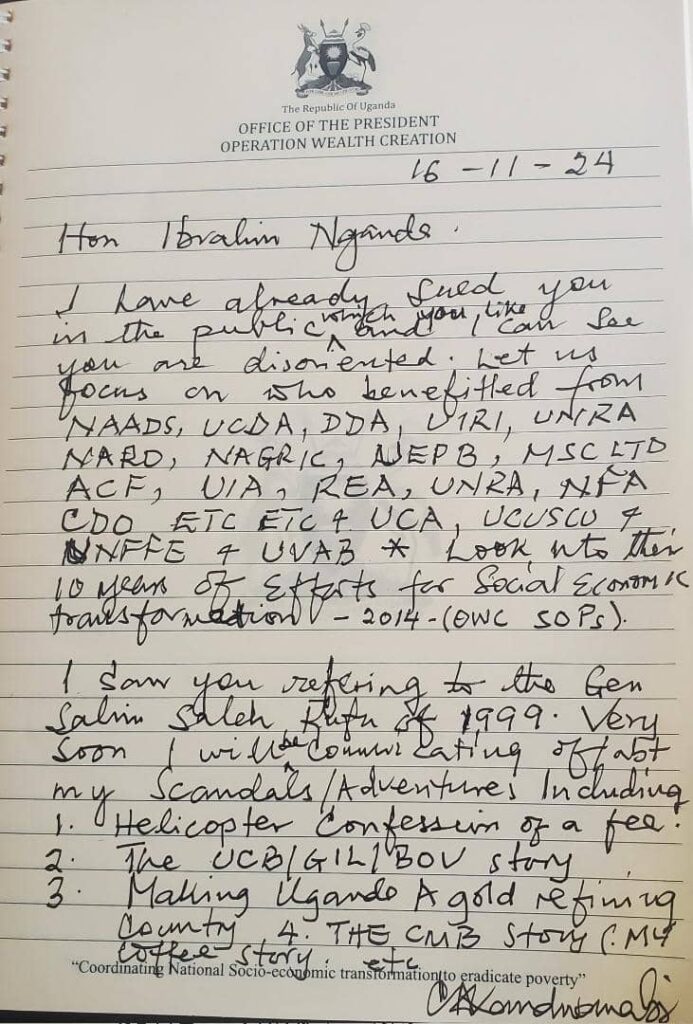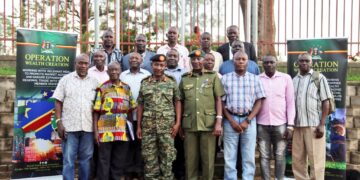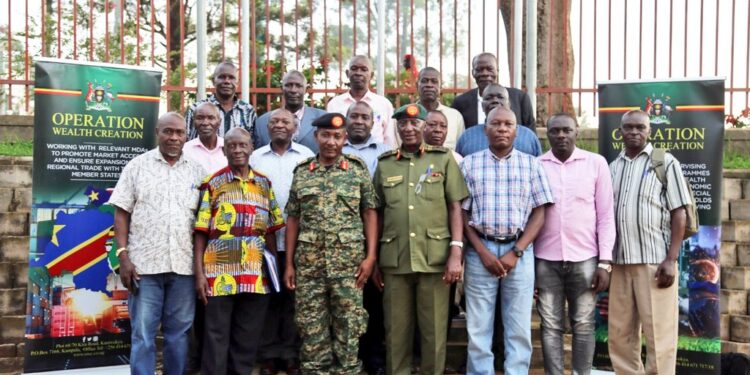Operation Wealth Creation (OWC) has dismissed untrue statements made by Kira municipality MP Ibrahim Ssemujju Nganda regarding the procurement of vehicles for OWC in an interview with a local television station.
In his presentation, MP Nganda alleged that the vehicles were purchased for the personal benefit of Gen Saleh. In response, Gen Saleh dismissed the statements as “false, ill-informed, and aimed at discrediting OWC and defaming its Chief Coordinator, (Rtd) Gen. Caleb Akandwanaho aka Salim Saleh”.
In a statement, the OWC said the vehicles deployed for OWC operations, both at the Secretariat and nationwide, were procured by the National Agricultural Advisory Services (NAADS) in strict accordance with the Public Procurement and Disposal of Public Assets Authority (PPDA) guidelines, within a transparent public finance framework.
According to the statement, the process followed Uganda’s established regulatory frameworks and legal standards, reflecting OWC’s commitment to public accountability.
“Gen. Akandwanaho Salim Saleh was never involved in procurement nor was he ever a supplier. Those interested in all NAADS suppliers are encouraged to check the PPDA database.”
According to Hon. Ssemujju’s misinformation the total procurement cost is Shs97bn, which OWC says is “a total misinformation because the procurement records according to NAADS is UGX 28BN and that information is available to the public”.
“This expenditure was necessary and justified to support OWC field officers, who have been instrumental in distributing agricultural inputs to beneficiaries and supporting communities nationwide in an efficient and effective manner. Claims of inflated costs are unfounded and lack factual basis and are meant to confuse the public,” reads the statement.

According to the statement, these efforts have contributed significantly to increased agricultural productivity, spurring economic growth and supporting the livelihoods of countless Ugandans. Through OWC’s contributions, Uganda has witnessed growth in both local economies and macroeconomic indicators linked to agricultural output. For example, coffee production increased from 3.24 million 60-kg bags in 2014/15 (valued at US$400.49 million) to nearly 8 million 60-kg bags in 2023/24, reaching a value of US$1.14 billion. Similarly, maize production doubled from 2.8 million tons in 2018 to 5.6 million tons in 2022, and milk production rose from 2.5 billion liters in 2018 to 3.1 billion liters in 2022. Tea production increased from 50,055 metric tons in 2017 to 81,675 metric tons in 2022 with a value of US$88.36 million, while banana production grew from 4.03 million metric tons in 2016 to 11.2 million metric tons in 2022, etc.
“These accomplishments underscore OWC’s pivotal role in advancing Uganda’s economy and supporting the livelihoods of Ugandan households, many of whom were previously outside the money economy and facing food and nutrition insecurity.”
OWC said the statements by Hon. Ssemujju suggesting that OWC was established for personal financial gain by Gen. Salim Saleh are both untrue and baseless.
“OWC was created to transform the agricultural sector. We urge all public figures and Ugandans alike to uphold accuracy, integrity, and responsibility when discussing matters of public interest and importance.”
OWC was established as a special Presidential initiative with a clear mandate to support Uganda’s agricultural and economic development. Contrary to any claims of irregularity or illegality, OWC was created legally and operates in full compliance with Ugandan law, specifically under Article 98 (1) of the 1995 Constitution of Uganda and Sections 8 (1) and 38 (2) of the Uganda Peoples Defence forces Act, 2005.
OWC’s structure, coordination with other government agencies, and adherence to public policies underscore its legitimacy and essential role in advancing socio-economic transformation across the country.








